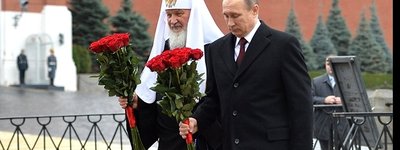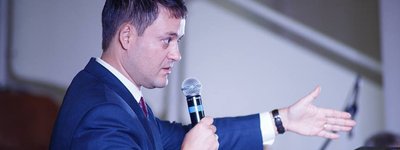The Political Trumps the Pastoral
…the Russia of 2018 holds much the same view of Ukraine, and its political as well as ecclesiastical independence, as did the Russia of 1917.
The Moscow Patriarchate’s reaction to the Ecumenical Patriarchate’s granting of autocephaly to the Ukrainian Orthodox Church on October 11 was predictable: by breaking communion, it fulfilled its own dire predictions of division in the Orthodox world. Now, the various Orthodox churches must decide whether to follow Moscow into schism, or to remain in communion with the Ecumenical Patriarchate.
The Moscow Patriarchate has justified its position with both historical and canonical arguments. For the past few centuries, it was content to base its power over the Kyivan metropolitanate on incomplete historical information. Now that scholars connected with the Ecumenical Patriarchate have discovered historical data supporting Ukrainian autocephaly, Moscow complains that the information is incomplete and that any conclusions must await further research.
The canonical arguments for and against Ukrainian autocephaly have been made, and canonists are best qualified to evaluate them. It is striking, however, that the Moscow Patriarchate considers itself in a position to judge the canonicity of actions by the Ecumenical Patriarchate. While it is commonly known that the Phanar does not have the kind of power and jurisdiction enjoyed by the Vatican in the Catholic Church, it does seem strange that the canonical judgment of Moscow should prevail over that of Constantinople.
Meanwhile, on October 18, the synod of bishops of the Russian Orthodox Church Outside Russia (ROCOR) came out in support of the Moscow Patriarchate against Ukrainian autocephaly. (“ROCOR Marches in Lockstep with Moscow Patriarchate,” Orthodoxy in Dialogue, 22 October 2018.)
What is ROCOR? The Russian Orthodox Church Outside Russia is descended from the Karlovci Synod, a church organization formed in exile in Yugoslavia after the Russian Revolution. Strongly anti-Bolshevik, this church, led by Metropolitan Antony (Khrapovitsky) of Kyiv, supported the idea of a “single, indivisible” Russia — including, of course, Ukraine. It opposed those hierarchs and clergy who, remaining in Soviet Russia, cooperated with the atheist regime. This included those whom Joseph Stalin permitted to form a revived Moscow Patriarchate of the Russian Orthodox Church (ROC-MP) during World War II. In his two-volume study “The Russian Church under the Soviet Regime, 1917-1982” (1984), the late Dmitri Pospielovsky gives a critical account of the Karlovci Synod.
Now centered in the United States, ROCOR has been a rival of those Orthodox parishes that followed the Moscow Patriarchate. In 1970, the ROC-MP granted autocephaly to its American parishes, thus creating the Orthodox Church in America (OCA). This move, however, was not condoned by the Ecumenical Patriarchate or the wider Orthodox communion. ROCOR remained at odds with the OCA.
After the fall of the USSR in 1991, ROCOR reconsidered its opposition to the Moscow Patriarchate. Its political opposition, after all, was no longer relevant. And there was a natural desire for unity with Russia’s Orthodox faithful. In 2007, ROCOR became a semi-autonomous part of the ROC-MP. It soon made amends with the OCA as well, and the two even concelebrated in New York in 2011. It thus appears that ROCOR is not opposed in principle to the creation of new autocephalous churches.
ROCOR’s reconciliation with the Moscow Patriarchate was evidently motivated by a desire to (1) re-establish unity with the Orthodox in Russia, (2) overcome historical-political divisions, and (3) normalize the canonical situation. These motivations stemmed from a pastoral concern for the good of Orthodox souls.
They bear a striking similarity to the motivations for Ukrainian autocephaly. In Ukraine, the movement for autocephaly is born of a desire for unity among the three Orthodox churches (the Ukrainian Orthodox Churches under the Moscow and the Kyivan Patriarchate, and the Ukrainian Autocephalous Orthodox Church). It is also motivated by a wish to overcome the historical alienation of millions of Ukrainians from the Orthodox Church because of its centuries-long control by a foreign power. It is well known that many Ukrainian intellectuals in particular have long been separated from Orthodoxy because the one officially sanctioned Orthodox Church in their country served the political interests of an oppressive Russian and (for several decades) Soviet government. The establishment of a canonical, autocephalous Ukrainian Orthodox Church free of foreign political control will facilitate the return of Ukrainian civic and intellectual leaders, as well as many ordinary Ukrainians, to the Orthodox faith.
Thus, as in the case of ROCOR’s re-establishment of communion with Moscow, Ukrainian autocephaly is motivated by a desire to (1) re-establish church unity, (2) overcome historical-political divisions, and (3) normalize the canonical situation. All three goals would contribute to the good of the Orthodox faithful. Logically, one might expect that the ROCOR leadership would understand their Ukrainian co-religionists’ legitimate pastoral concerns.
But such logic would be naïve. ROCOR is blinded by its historical support of Russian imperial interests, and by its recently re-established unity with a Church subservient to a neo-imperial regime. After all, the Russia of 2018 holds much the same view of Ukraine, and its political as well as ecclesiastical independence, as did the Russia of 1917. And in today’s world, even in church life, the political trumps the pastoral — and logic itself.










